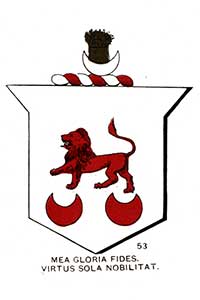The Cavanagh Family

(Crest No. 53. Plate 23.)
THE Cavanagh or Kavanagh family is descended from Milesius, King of Spain, through the line of his son Heremon. The founder of the family was Fiacha Baiceada, son of Cathire More, King of Ireland, A. D. 144. The ancient name was Caoimheachan, and signifies “Entertainer.”
The possessions of the family embraced the territory called Ui Cavanagh, now the barony of Idrone East, in the County of Carlow, and the heads of the sept held in modern times the title of Kings of Leinster.
Art McMurrough O’Cavanagh, famous for his contests with the English forces under King Richard the Second, in the latter part of the fourteenth century, was one of the most celebrated of Irish chiefs. Richard came to Ireland twice with a large force to crush the MacMurroughs, and signally failed, the Irish king declaring that “he would neither submit nor obey Richard in any way, but affirmed that he himself was the rightful king of Ireland, and that he would never cease from war and the defense of his country till his death, declaring that the wish to deprive him of his land by conquest was unlawful.” Failing to defeat the Irish chief in war, Richard offered 100 marks reward for his assassination, but the wily chief evaded treachery as successfully as he encountered the open enemy. Richard was meantime recalled to England by a rebellion that had broken out in his absence. This was the beginning of the Wars of the Roses that deluged England with blood for nearly a century.
Richard, shortly after his arrival in England, was dethroned and assassinated in his prison. MacMurrough continued to make war on the English, capturing most of their strongholds, and defeating the Dublin garrison, under Lord Thomas of Lancaster. He ruled supreme within his own territory, defeating the English wherever they encountered him until his death, in 1417, in his sixtieth year. “In the Irish history of the Middle Ages,” writes McGee, “from Brian’s era to Hugh O’Neill’s, he has no equal for prudence, foresight, perseverance, valor and success.” The Four Masters speak of him as “a man who had defended his own province against the English from his sixteenth to his sixtieth year; a man replete with hospitality, knowledge and chivalry; a man full of prosperity and royalty; the enricher of churches and monasteries by his alms and offerings; a good father and a true friend; a cultivator of knowledge and a lover of letters.”
Donal O’Cavanagh, surnamed Spainagh, or the Spaniard, was also a famous leader in Leinster in the wars against Elizabeth. The celebrated Brian-na-Stroice of Drummin, son of Morgan, son of Dowling Kavanagh of Ballyleigh, in the County of Carlow, was the largest officer in King James the Second’s army, and distinguished himself by his valor at the battles of the Boyne and Aughrim. He remained in Ireland after the capitulation of Limerick, and lived at Drummin until 1735. His son, John Baptist Kavanagh, left Ireland after the surrender to the Williamites, and became Baron Linditz, and an Aulic Councilor in Austria.
Of the other members of this family, who attained distinction on the Continent were General Kavanagh, Governor of Prague, and another Kavanagh, Governor of Buda; Field Marshal Kavanagh of Vienna, Marshal Maurice Kavanagh, Chamberlain of Poland, and another Kavanagh, Chamberlain in Saxony; Count Kavanagh of the Holy Roman Empire; Godefroi Cavaignac, the French Conventionist of 1793, co-editor with Armand Carrell, and his son, General Eugene Cavaignac, for a time Dictator of France, and the opponent of Louis Napoleon in the contest for the Presidency of the Second Republic, in 1848.
In the United States , also, this ancient Leinster house has been honorably represented. One of the most noted men who held public office during President Jackson’s administration was Edward Kavanagh, United States Minister to Portugal. He had previously been a State Senator and Acting Governor of Maine. A man of scholarly attainments and refined tastes, he brought on his return a valuable collection of Spanish and Portuguese literature, which he distributed among various institutions and libraries.
Gen. James Cavanagh of Brooklyn, N. Y., who served with distinction in Meagher’s Irish Brigade during the late Civil War, is also a descendant of this family. General Cavanagh was born in the County of Tipperary, Ireland. Apart from his war record, he has to his credit a military service of nearly forty years as an officer in the New York State National Guard. He is in every way a worthy representative of the powerful Leinster sept that gave so many eminent soldiers and civilians to Ireland and Continental Europe.
